The train horn bellows as the steam engine labors over Cumbres Pass and the acrid stench of black smoke from the coal boiler drifts across the mountain. Striding the ridge line I realize the obvious: the Continental Divide Trail is so called because that’s its path, the western watershed. It follows a high line from which a raindrop falling to my left runs via rills and brooks, creeks and rivers to reach, in good time, the Atlantic. A drop pitching to my right will eventually add to the vast Pacific. Thus my journey is not the usual mountain tramp of elevation gain and loss but one that hugs the contours as much as can be expected in any range.
For this I am gratefu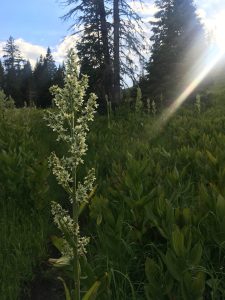 l. I’ve just embarked on my seventieth year and my mountaineering days are past. A multi-day hike even on rolling terrain will test my creaking joints and aging heart, perhaps to the limit. Such morbid thoughts are tempered by the memory of the hiker who set off on this route a few years back and did indeed meet his demise not far south of where I now walk.
l. I’ve just embarked on my seventieth year and my mountaineering days are past. A multi-day hike even on rolling terrain will test my creaking joints and aging heart, perhaps to the limit. Such morbid thoughts are tempered by the memory of the hiker who set off on this route a few years back and did indeed meet his demise not far south of where I now walk.
On November 14th, 2015 Stephen Olshansky began the last cold mountain section of his southbound thru-hike of the Continental Divide Trail (CDT), and his last journey ever. “Otter”, as his trail moniker labeled him, was a member of an exalted coterie of long distance hikers. Not once but three times each he had walked the CDT, the Appalachian and the Pacific Crest Trail. Yet for all his massive back-country experience, some twenty four thousand miles on the marquee trails alone, Otter contrived to make a series of blunders that cost him his life.
These thoughts dog me as I enter the first wooded terrain and I’m immediately stopped dead in my tracks. A black bear has just bounded across the trail a mere baseball pitch ahead. I reckon it had one gait left: the charge. Mercifully I don’t see that gear, but I’m amazed and sobered. It’s as if the forest gods were at once offering a welcome and a warning: “C’mon on in. But beware.”
I stand motionless for minutes, scouring the woods for cubs, before setting off gingerly, peering anxiously into the trees. The path climbs through Ponderosa pines and a wide swathe of gorgeous blue columbine and scarlet gilia. I settle into the keen rhythm of the walk.
The clearings that dot the stands of white fir, through which I stroll next morning, remind me of where Otter first camped and where, in a video extracted from his phone long after his death, he first realized the gravity of his situation. His initial mistake may have been hubris. Having hiked the spine of the Rockies through some of the gnarliest country the American west can offer he was only a few days amble from the lower elevation of the high deserts of New Mexico where he would find warm days, dry country, cool clear, fall nights. So he hung around the ‘fleshpots’ of Chama and Pagosa Springs, 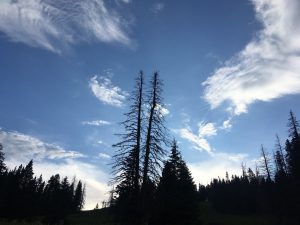 convinced, it seems, that he’d cracked it, that he could chalk up another completion of one of the big three.
convinced, it seems, that he’d cracked it, that he could chalk up another completion of one of the big three.
But not long after he left his friend at ten thousand feet and ventured into the snow covered hills another storm blew in. Post holing through deep drifts chilled his toes and by the time he camped frostbite had taken hold and the pain was intense. “I’m in big trouble.” His disembodied voice bemoans as the phone camera pans across a snow packed glade. “I’ve rolled the dice and lost.”
I emerge from the tree cover, cross the lovely open catchment of the East Fork of the Brazos and camp. My daily mileage is pitiful when compared to seasoned thru hikers like Otter. But distance is not my goal. Since I attempted any serious hike or climb I’ve had both knees replaced and a shoulder rebuilt; I’m out of shape and over weight. Solitude, peace and quiet, respite from LCD are my goals. I sit by the fire, sip the single malt and watch the Pleiades rise. I’m beat, sore, scratched, bitten, lonesome, and as content as I have been in many a month.
Our species is restless, nomadic. Walking is our rubric. For millennia we have wandered this planet of ours. We are driven to pack up, move out, walk on to lusher pastures, fatter game, sweeter water. Given the unfathomable arc of time the period of drawn vehicles is fleeting; that of machine transport infinitesimal; that of bipedal travel an immeasurable span.
Perambulatio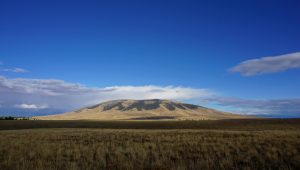 n is said to improve intellect. It was integral to Bertrand Russell’s work; Nietzsche claimed, “only thoughts reached by walking have value”; Aristotle lectured as he ambled the colonnades of Athens; “I have walked myself into my best thoughts” declaimed Kierkegaard.
n is said to improve intellect. It was integral to Bertrand Russell’s work; Nietzsche claimed, “only thoughts reached by walking have value”; Aristotle lectured as he ambled the colonnades of Athens; “I have walked myself into my best thoughts” declaimed Kierkegaard.
Great literature has come from excursions afoot. Laurie Lee strolled the breadth of Spain between the wars sustained solely by his violin and wrote as fine a travel book as is penned; an odyssey from the Hook of Holland to Constantinople gave Patrick Leigh Fermor material for his brilliant, erudite trilogy. Pilgrims have long sought enlightenment or salvation through the perils and trials of long distance treks.
Otter surely found inspiration in marathon treks. Those outside this arcane community of long distance walkers must show utter incomprehension when told of someone spending an entire summer walking the breadth of this nation. However to those who complete one of these paths it seems not only a solace but also an inspiration as recent books and movies tell.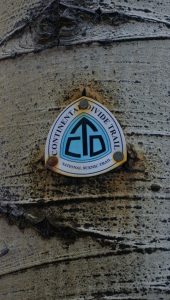
Otter awoke one bitterly cold morning and realized that he alone could extricate himself. He packed and set off for Chama. But whether it was flu, his meager rations, or his frostbite, before long his strength ebbed and he staggered back to his tent. The welcome comfort of a down sleeping bag soothed the pain in his frozen toes but each time they were taking longer to thaw. He was left with one option to save his life. A campground called Lagunitas was the next landmark on the trail south and closer than Chama. If he could make it there perhaps someone would snowmobile out there, perhaps he would find some food stashed, perhaps someone would be there.
No one will ever know what strength of character it took, and what agonies he endured to make that final struggle. However try envisaging a hike on which every step sends a shock of tortuous pain through your toes and feet, on which you are dogged by continuous dizziness and exhaustion, on which you stumble and plunge through deep snow, with no certainty of finding your way on a snowbound track, with no companionship and with but the faintest hope of help at the end, you’d be close to knowing what this wretched fellow endured on his last hike.
He made the campground at the bedrock of his strength and found, mercifully, the open potty, a dry haven, free of the ubiquitous snow. He set up his tiny wood stove and took the chill off the concrete mausoleum. In the ensuing days he discovered a good horde of horse feed; a blessing it must have seemed at the time but only proved a cruel curse that prolonged his torment.
I am walking the rocky path across the Brazos ridge in bright sunshine when a movement ahead catches my eye. A man, a horse, three dogs . “Para cabrones” the rider cracks a whip at the aggressive heelers and they cower back. A shepherd working the flocks for the summer. His single English word is of course sheep. He seems delighted with my pidgin Spanish and laughs often, probably at my lousy grammar as much as his apparent delight in the rare human contact.
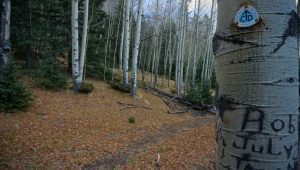 In the mid afternoon I drop into a saddle and the rain clouds I’ve been tracking unleash their bounty. A quick scramble has the new lightweight tent pitched and I dive inside wondering if this flimsy fly will hold off a torrent. It does. I sleep the rump of the afternoon and emerge to a dramatic evening and a view from the ridge as fine as can be beheld.
In the mid afternoon I drop into a saddle and the rain clouds I’ve been tracking unleash their bounty. A quick scramble has the new lightweight tent pitched and I dive inside wondering if this flimsy fly will hold off a torrent. It does. I sleep the rump of the afternoon and emerge to a dramatic evening and a view from the ridge as fine as can be beheld.
Perhaps a hundred miles North the late light coppers a fourteener, probably Carson. My gaze is drawn down the Sangre de Cristos, over Crestone and the brilliant climb of the Ellingwood Arête, past Blanca, then the Spanish Peaks and over the state line into New Mexico, the dappled peaks above Taos and then the Pecos Wilderness shouldering Santa Fe. In the middle ground the long cooled volcanoes of the San Luis Valley and the cleft of the Rio Grande. Beneath me the lovely copses and meadows of the headwaters of the Los Pinos River. Crimson clouds fleck the eastern skies, a phenomenon I’ve only seen in such glory in the American Southwest. The fire’s flames flail in the wind. I drain the scotch and retire in bliss.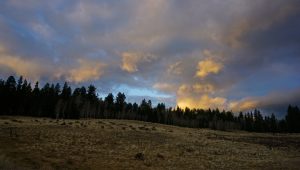
Death by starvation may not be the most agonizing way to depart this world but must surely be the most forlorn. If moisture is available it takes a long, long time for the body to atrophy, for the systems to fail. Otter predicted his death long in advance. Once he had lurched, stumbled and suffered to the Lagunitas campground he began the long, vain wait for rescue. He marked a large HELP in the snow. He heard the drone of a plane and torched a shed. The plane flew on. Various agencies launched search 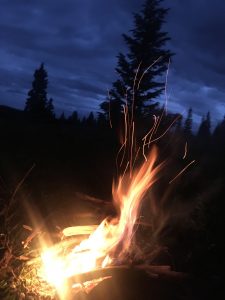 parties but none made it to the campground. They failed him appallingly; a perfect storm of false leads, poor effort and incompetence. His own food long gone he meted out the oats over the weeks, as his body withered and the cold crept inexorably into his limbs and core. He fashioned ‘skis’ from some metal roofing of the hut he’d burned and set off, yet again. A plane passed overhead while he stood in wide open country flinging wide his arms and shouting. “They must have seen me,” he wrote in his diary on returning to the latrine, but the false hope simply meant further disappointment, keener despair.
parties but none made it to the campground. They failed him appallingly; a perfect storm of false leads, poor effort and incompetence. His own food long gone he meted out the oats over the weeks, as his body withered and the cold crept inexorably into his limbs and core. He fashioned ‘skis’ from some metal roofing of the hut he’d burned and set off, yet again. A plane passed overhead while he stood in wide open country flinging wide his arms and shouting. “They must have seen me,” he wrote in his diary on returning to the latrine, but the false hope simply meant further disappointment, keener despair.
Christmas and New Year passed and his spirit sank to a nadir. His poignant journal entries reflect both his despondency and his decency. There is hardly a word of scorn for the lack of rescue; instead a gradual acquiescence of his fate. He wrote his farewells to his friends and tried to asphyxiate himself in his awful shelter. He scraped a woodsaw across his wrist and drew blood but either failed to lose enough, or more likely, buoyed still by a love of life, he staunched the flow. His diary shows that his flame burned well into February. He had clung on some three months after his departure from the road but eventually the oats ran out, his body failed and the flame guttered. He scratched a final evidence of his humanity on the outhouse door “Dead CDT hiker inside”, locked the door and laid down to die. And throughout the length of that harsh winter no one had had the common sense to search the most obvious place a hiker in trouble heading South on the trail through deep snow from Cumbres Pass would seek shelter.
I approach Lagunitas, my goal, the car, rest, a cold one, yet my spirits, which should be soaring, are low. A brace of rufous humming birds strafe each other and I brim with wonder at how these tiny beings, will, in a few weeks, soar into the troposphere, and then hurtle down to the tropics, hearts the size of peas thrashing incredibly at ten times the rate of mine. A tiger swallowtail butterfly, wingspan twice that of the hummers, sups nectar at an Indian paint brush, then wafts away on gossamer wings in light morning air. A hoarse shriek from a Swainson’s hawk, the iconic buteo’s cry I’ve heard and loved the world over, rings out. That these bright cameos of nature’s random theater are lost to Otter further dampens my mood. I gaze across the tear drop lakes and shed my own for this fine planet, this decent man, the abject failure of those tasked to save him, the desolate sorrow of his lingering death alone in the concrete hovel of a campground toilet.